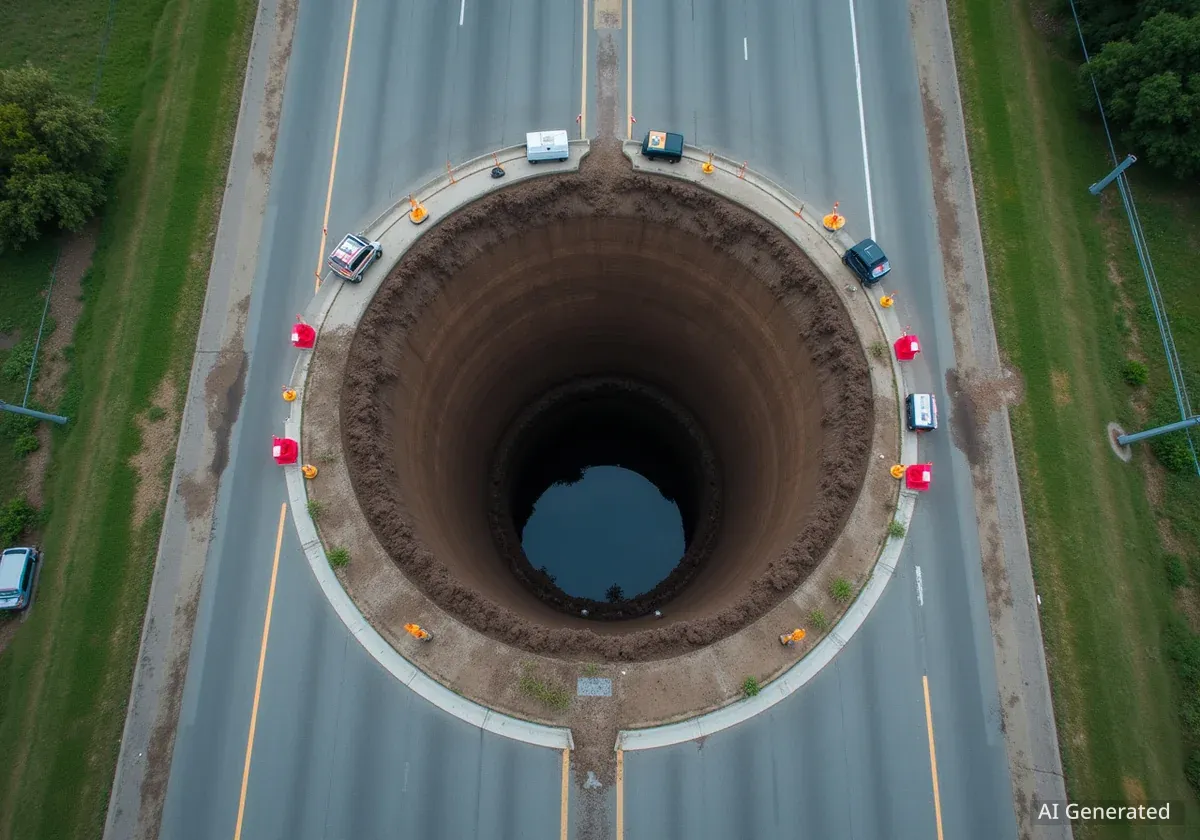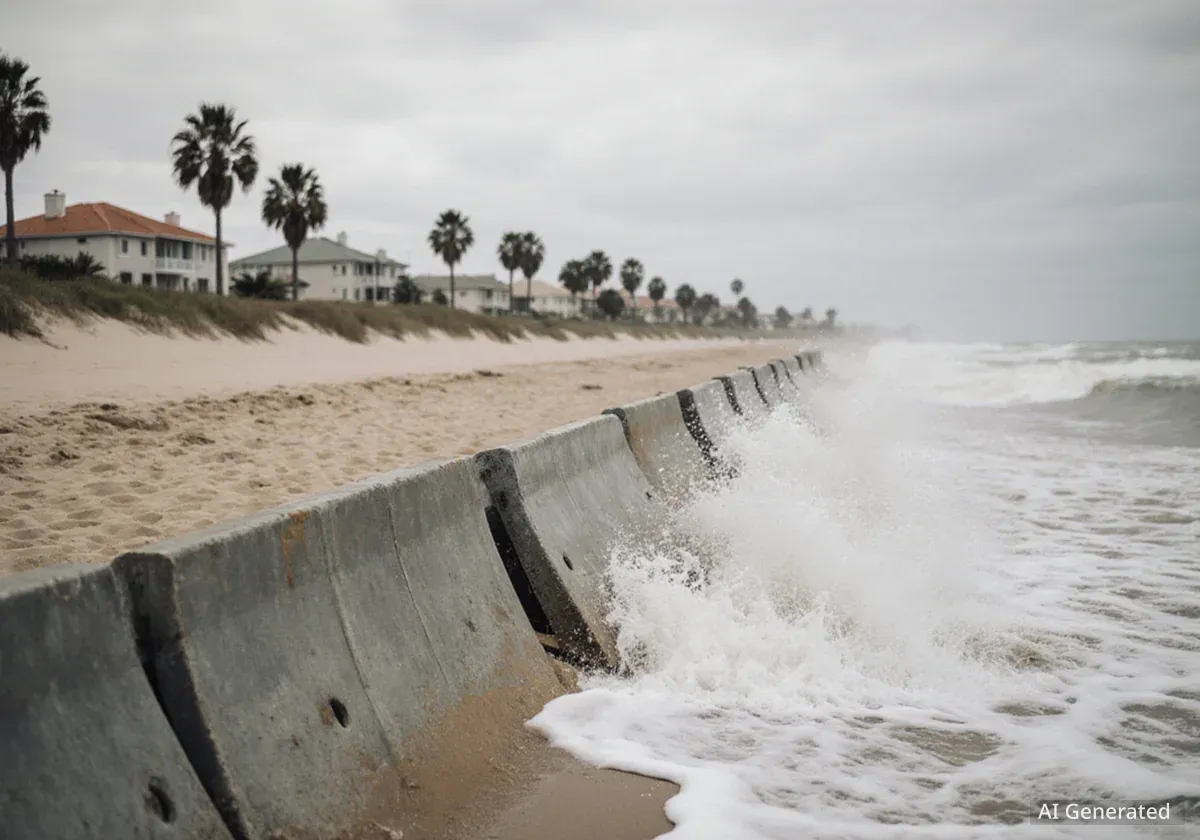A key roadway in Winter Haven, Florida, has been indefinitely closed after engineers discovered a large tunnel had formed beneath its surface near a construction site. City officials confirmed the closure of Intermodal Drive on Friday morning as a precautionary measure to ensure public safety.
The underground cavity, described as approximately the size of a football field, was created by water flowing between two retention ponds. The roadway itself has not collapsed, but the stability of the ground beneath it is under urgent evaluation.
Key Takeaways
- Intermodal Drive in Winter Haven, Polk County, is closed to all traffic due to a large underground tunnel.
- The tunnel formed between an existing retention pond and a new one under construction, caused by a siphoning effect.
- The road surface remains intact, but the closure is a safety precaution for the heavy truck traffic it serves.
- The property, roadway, and infrastructure are privately owned, and the owner's engineers are managing the assessment and repair plan.
Engineers Discover Subterranean Cavity
City officials in Winter Haven responded to the area near Intermodal Drive on Friday, October 10, after reports of a significant ground issue. Upon arrival, engineers confirmed the formation of a large underground tunnel connecting two separate water retention ponds.
The discovery prompted the immediate closure of the road. According to a statement from the city, the decision was made out of an abundance of caution. Intermodal Drive is a critical route for heavy commercial vehicles, including fully loaded semi-trucks, which exert significant pressure on the road surface.
Understanding Retention Ponds
Retention ponds are engineered basins designed to collect and manage stormwater runoff. They are common in Florida to prevent flooding and filter pollutants before the water enters natural waterways. The stability of the ground around them is crucial for nearby infrastructure.
Construction Work Triggers Siphoning Effect
The formation of the tunnel has been linked to nearby construction activity. An existing retention pond is located on one side of Intermodal Drive, while excavation for a new pond was underway on the opposite side.
Officials explained that as the excavation work progressed, it created a pressure differential between the two bodies of water. This resulted in a siphoning effect, where water from the established pond began to flow underground toward the newly excavated basin.
Over time, this continuous flow of water eroded the soil and material beneath the roadway, carving out the large tunnel that now exists. This process, known as internal erosion or piping, can compromise the structural integrity of the ground supporting overlying infrastructure.
Assessment and Stabilization Efforts Underway
While the pavement on Intermodal Drive has not yet shown signs of failure, the primary concern is the large, unsupported void beneath it. The property owner’s construction team and specialized geotechnical engineers are now on site to address the situation.
Fact: The underground tunnel is reported to be approximately the size of a football field, highlighting the significant volume of earth displaced by the water flow.
The Engineering Challenge
The immediate task for the engineering team is to conduct a thorough assessment of the tunnel's size and the stability of the surrounding soil. This typically involves using ground-penetrating radar (GPR) and soil borings to map the extent of the cavity without further destabilizing the area.
Once the assessment is complete, engineers will develop a remediation plan. The most common method for a situation like this involves filling the void with a stable material. According to industry practices, this could include:
- Grouting: Injecting a cement-based mixture or specialized polyurethane foam into the void to fill it and stabilize the soil.
- Controlled Fill: Excavating sections of the road to backfill the tunnel with compacted soil or aggregate.
The goal is to ensure the ground beneath the road is fully stabilized and capable of supporting the weight of heavy truck traffic before it can be reopened.
Private Ownership and Public Safety Collaboration
Winter Haven city officials have clarified that the construction site, the roadway itself, and the related stormwater infrastructure are all privately owned and maintained. As a result, the responsibility for the assessment and repairs falls to the property owner.
"The property owner’s construction team and geotechnical engineers are on site assessing the situation and determining the best method to safely fill and stabilize the area," the city stated in a public announcement.
Despite the private ownership, the city is actively involved in ensuring public safety. City of Winter Haven staff are on-site to provide support as needed. Furthermore, the Winter Haven Police Department is managing the road closure, with officers expected to maintain the blockade overnight and until the area is deemed safe.
The duration of the closure on Intermodal Drive remains unknown and is dependent on the findings of the geotechnical assessment and the complexity of the required repairs. Officials will provide updates as more information becomes available.





